Flavour of Success
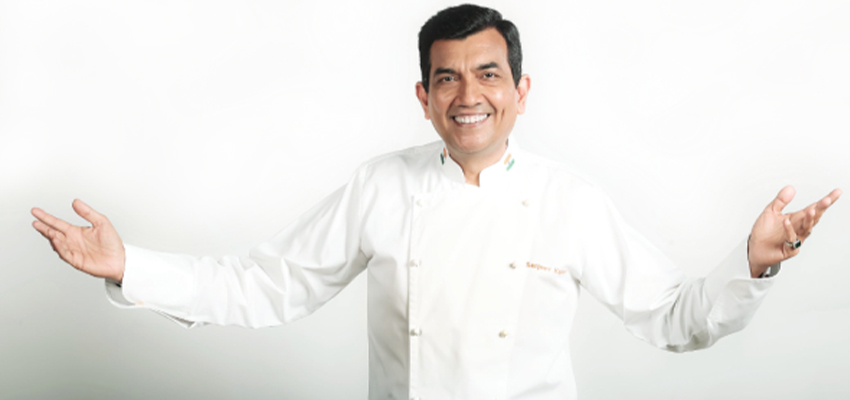
"It brings me immense joy to know that I am often acknowledged for transforming the perception of hospitality as a reputable career choice. Watching the norms change in the country, surely puts a smile on my face"
-Sanjeev Kapoor,
Celebrity Chef
Ever since the early 90s, Sanjeev Kapoor has emerged as a household name, enthralling audiences in every age-group, across the nation. With his afternoon show, he provided a compelling incentive to forgo post-lunch naps, as viewers eagerly took notes on his delectable recipes.
Undeniably, it was celebrity chef, Sanjeev Kapoor, who rekindled our passion for food and cooking, captivating us once more with his culinary magic. From cooking in his home kitchen, to hosting the legendary show, Khana Khazana, to putting India on the global food map, Kapoor, an international culinary icon, not only infused innovative recipes with cherished traditions but also shattered gender stereotypes throughout his journey.
In a tete-a-tete with the Corporate Citizen, Sanjeev Kapoor talks about his passion for cooking, throws light on the fact that how Zee TV got him back on Khana Khazana after rejecting him despite shooting a few episodes, his favourite ingredients, his vision for the future of Indian cuisine and lot more
CC: Hello Chef, walk us through your growing up days.
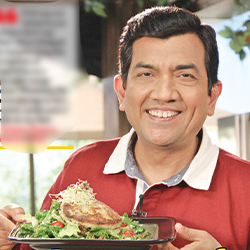
Sanjeev Kapoor: Having born in Ambala and raised in the humble Kapoor family, I have developed a big picture on life and people. Besides, having stayed in different cities during my growing up years has made me broadminded. I firmly believe that life has much more to offer beyond its surface and I approach every individual with understanding and acceptance rather than quick judgment. My father worked as a dedicated banker and my mother played the role of a loving homemaker, holding our family together. Completing our Kapoor clan was my elder brother and younger sister, forming a close-knit unit that shares meals filled with love and togetherness.
Our upbringing revolved around deeply rooted traditional values. Witnessing my father's tireless efforts, I gained a profound appreciation for humility and learned the importance of facing challenges with resilience and unwavering determination. Treating everyone with utmost respect and compassion became a core value. Moreover, my parents' guidance taught me the power of maintaining a positive attitude and wearing a smile, even during the most trying times.
Even now, by reframing the way I perceive the world and valuing authenticity and empathy, I strive to embrace the richness and diversity of life, constantly seeking personal growth and understanding.
The magic of culinary world
Observing my mother and grandmother meticulously prepare elaborate and traditional meals was a constant source of inspiration for me. However, it was my father who truly sparked my passion for cooking. Whenever I accompanied my father to the local market, handpicking fresh vegetables and juicy fruits for our family, those moments felt complete. It was on those occasions that I first interacted with ingredients, developing a keen palate at a young age.
Furthermore, my father's introduction to non-vegetarian cuisine opened a whole new world of flavours for me. As my mother primarily cooked vegetarian meals, I honed my understanding of vegetarian food from her. Determined to explore this culinary realm, I groomed my skills in creating delicious meals, blending my vegetarian background with the rich flavours of non-vegetarian cuisine.
Witnessing my brother's culinary prowess in the kitchen further fuelled my interest in cooking. His talent and expertise ignited a strong desire within me to delve deeper into the culinary arts. It was the collective influence of my family, the Kapoor clan, that shaped my passion from a young age, paving the way for my journey to become an international chef.
Embracing the legacy of my family's love for food and their dedication to crafting memorable meals, I found my calling in the culinary world. Each experience and exposure, from my mother's traditional recipes to my father's non-vegetarian delights and my brother's culinary expertise, contributed to my culinary growth and ultimately shaped me into the chef I am today.
CC: What role did education play in your career journey in the food industry?
Owing to my father's transferable banking job, I completed my schooling from 20 different schools across our country. Even as a child, I had a penchant for embracing the extraordinary, such as selecting Sanskrit as an optional language during my school years, which helped me understand our roots and heritage better. However, an unexpected turn of events occurred when my biology teacher critiqued my diagram, prompting me to abandon my aspirations of becoming a doctor.
Feeling that engineering held little surprise, I ventured into the realm of architecture. Little did I know then that this decision would eventually lead me to forge a path in the field of Hotel Management.
Defying conventions
Reflecting upon my past, I now understand how my early inclination towards defying conventions, coupled with my educational background and diverse experiences, have equipped me to tackle the challenges inherent in the food industry. Working in restaurant and five-star kitchen operations is never easy. The pressures are relentless, demanding one to stay on their feet throughout the shifts and sometimes even longer. In such demanding situations, I am reminded of my father's wise words, ''You must confront life's challenges with a smile.''
These experiences and insights have instilled in me the resilience and determination needed to thrive in the culinary world. I comprehend the significance of maintaining composure and embracing challenges headon. It is through these experiences that I have acquired a profound understanding of the demanding nature of the food industry and the importance of upholding a positive attitude. As I continue to forge ahead, I carry these lessons with me, shaping my approach to overcome obstacles, excel in my craft and reach new milestones in my area of work.
"Not all accidents have negative outcomes; some can lead you down unexpected paths that bring a lifetime of happiness and joy. My journey as a chef is purely accidental"
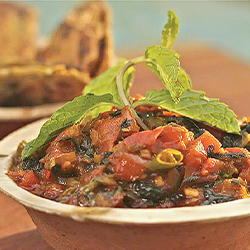
CC: What inspired you to pursue a career in the culinary industry and how did you get started in your current role?
Not all accidents have negative outcomes; some can lead you down unexpected paths that bring a lifetime of happiness and joy. My journey as a chef is purely accidental. Originally, I had planned to pursue architecture due to my proficiency in engineering drawings and the field's relative lack of popularity at that time. I had secured a seat at the School of Planning and Architecture in Delhi. However, simultaneously, I had also cleared the interview at The Institute of Hotel Management, Catering and Nutrition (IHM) in Pusa, Delhi, along with a friend.
Ultimately, the advice of a friend's father helped me make the decision between architecture and hospitality. Acting upon his counsel, I chose to pursue hospitality.
After completing my diploma course, I joined ITDC, where I worked long hours and absorbed every new learning opportunity that came my way. During my assignment at their property in Benares, I worked under a Chef and showcased my capabilities, eventually earning the position of kitchen in-charge. Later, I moved to Mumbai and spent five years at Centaur Hotel, where I became the Executive Chef. This early success prompted me to pursue a Masters in Marketing Management at Narsee Monjee Institute of Management Studies (NMIMS) and subsequently, I ventured into the world of television.
CC: You mentioned that your father cooked lip-smacking non-vegetarian food, later you followed the tradition and put an end to the stereotype that men shouldn’t enter the kitchen, which inspired all. How does it make you feel?
In the kitchen, there are no gender boundaries when it comes to preparing delectable cuisine. Both men and women can unleash their culinary prowess and whip up amazing dishes – that is what I learnt when I silently watched my father share the kitchen duties with my mother. My father's culinary skills not only impressed me, but they also inspired me to take up kitchen operations. I can definitely say that whatever I am in my life, personally and professionally, I owe it to my father.
With the unwavering support of my loved ones, I embarked on a career path that led me from the role of an Executive Chef to that of a successful restaurateur. Along the way, I had the privilege of spearheading the world's first 24x7 food channel, penning cookbooks, establishing Wonderchef (cookware and kitchen appliances) and founding the esteemed Sanjeev Kapoor Academy. It brings me immense joy to know that I am often acknowledged for transforming the perception of hospitality as a reputable career choice. Watching the norms change in the country, surely puts a smile on my face. Even today, the overwhelming love and admiration I receive from viewers serve as a constant reminder of the positive impact I have made.
CC: An advice that changed your life
This was after school, when I was seeking admission for higher studies. I applied for a seat in a renowned architectural college. While I waited for their response, a friend suggested that I also apply for a seat in the Catering College, just as a Plan B. I did that and was pleasantly surprised when I got a call for the interview and was subsequently selected. I went on to complete my diploma.
This decision was not easy. I was in a dilemma. At the time of actually deciding between hotel management and architecture, my father’s friend told me one thing, “It is better to excel in a mediocre field than being mediocre in an excellent field.” I understood what he meant and I opted for hotel management. This also fulfilled my desire to pursue an unusual career.
At the time of actually deciding between hotel management and architecture, my father’s friend told me one thing, “It is better to excel in a mediocre field than being mediocre in an excellent field.” I understood what he meant, and I opted for hotel management
CC: What it takes to rise to celebrity status?
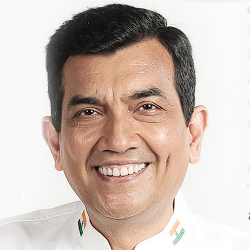
Upon completing my diploma in 1984 from The Institute of Hotel Management in (IHM)- PUSA, my professional journey took off as I joined ITDC as a management trainee. Within a span of two years, I advanced to the role of kitchen in-charge at their prestigious property in Varanasi and later found myself at ITDC Hotel Samrat in Delhi. Seeking new experiences, I eventually made my way to Centaur Hotel in Mumbai, where I dedicated five fruitful years as the Executive Chef.
It was during my tenure at Centaur Hotel that an exciting opportunity came knocking on my door. I was approached to host a cookery show on Zee TV, initially named 'Shriman Bawarchi'. Recognising its potential, I proposed a more captivating title, thus giving birth to the iconic show, 'Khana Khazana'. It was through this show that I introduced the world to a delectable creation called ‘Shaam Savera’ – a refined and elegant rendition of paneer-stuffed spinach koftas simmered in a velvety tomato puree.
These experiences not only shaped my career but also allowed me to share my passion for cooking with a wider audience. They paved the way for my culinary innovations and the subsequent establishment of my brand, creating a lasting impact on the world of Indian cuisine.
CC: As the host of the popular TV show Khana Khazana, what were some of the most memorable moments or experiences you had?
The journey of my television career had its fair share of ups and downs, with some remarkable moments that left a lasting impact. Initially, Zee TV had rejected me despite shooting a few episodes of Khana Khazana. However, fate had a different plan and they eventually reconsidered me. This turn of events marked a significant milestone in my life.
One particular recipe, the Shaam Savera, played a pivotal role in propelling me to fame. This exquisite creation resonated with viewers and became a symbol of my culinary expertise. Its popularity not only brought recognition to my work but also showcased the potential of innovative and refined Indian cuisine on a wider platform.
The overwhelming love and support
One of the most gratifying aspects of hosting Khana Khazana was receiving heartfelt letters from viewers. Among them were soon-to-be-married girls, housewives, mothers, mothers-in-law, professionals and even husbands, expressing their gratitude for teaching them the art of cooking. These letters revealed the profound impact my simple cooking show had on their lives and it was truly heartwarming to know that I had played a role in bringing joy and harmony to their households. In fact, I even received a marriage proposal, which was totally unexpected.
Those were truly wonderful days filled with moments that highlighted the power of food, cooking and television, to connect with people and make a positive difference in their lives. These experiences continue to inspire me and fuel my passion for sharing the love of cooking with others.
CC: How do you come up with new and innovative recipes? Can you walk us through your creative process?
The thing with ideas, as you would agree too, is that they can strike you at any time. Most of the times though it’s knowing how to blend the art of cooking with the science behind it. Also at times, innovations happen as a matter of sheer accident.
I believe that clinging to old becomes stale and in today’s fast-changing world becoming obsolete doesn’t work. We need to broaden our horizons while staying in touch with one’s roots. I am fortunate to get to sample an array of innovations daily.
I am not a fan of cooking the same dish twice. I tend to add a different touch to the dish even if I am making a simple recipe like palak paneer. I try and experiment with ingredients and dishes, to come up with something new that my viewers like. It is fun to refresh old recipes and sometimes this involves taking bold steps too. Experimentation is the key to innovation. Also, having an open mind to create and accept experiments is a must.
I have been nurturing my dream of making Indian food a global phenomenon. Of all the international cuisines I’ve tried, no other cuisine matches the depth and intensity of Indian cuisine. It makes me proud to see Indian food getting noticed in its original form as well as in fusion avatars the world over
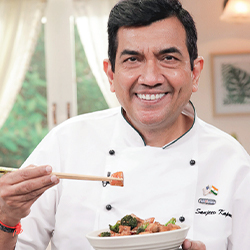
CC: What are some of your favourite ingredients to work with and why?
Exploring the culinary world is incomplete without the remarkable contributions of all our fabulous ingredients. These are elements that complete our dishes and give them life. From this massive universe of ingredients that captivate my culinary spirit, spinach holds a special place due to its remarkable versatility and health benefits. Its ability to seamlessly merge into a myriad of dishes never ceases to amaze me. On the other hand, I find brinjal to be an underappreciated gem, a treasure waiting to be discovered by the discerning palate. Whenever the opportunity arises, I eagerly incorporate this underrated ingredient into my creations, relishing the unique flavours it brings to the table.
Delving into the realm of spices, cardamom, clove and pepper, reign supreme as my personal favourites. These aromatic wonders possess an innate charm that effortlessly transcends culinary boundaries, enchanting both sweet and savoury preparations alike. Their ability to infuse dishes with an exquisite blend of fragrances and flavours is truly a testament to their remarkable versatility. These ingredients form the essence of my culinary journey, enriching every dish with their inherent magic.
CC: How do you balance traditional Indian flavours with modern culinary trends in your cooking?
As a Chef and a creative person, it always helps to have an open mind. I have never cooked a recipe more than once. There is so much to explore, so many new combinations and cuisines to try, then why stick to one?
While I do respect and am inspired by our traditional Indian recipes, I and my team always strive to come up with innovative recipes that I can share with my audiences. We ardently seek to create and present avant-garde recipes that captivate and inspire. With each passing day, we embark on a relentless quest to unearth novel combinations, embark on gastronomic adventures and explore the diverse tapestry of global cuisines.
CC: Continuing on the same lines, are there any regional cuisines in India that you find fascinating or enjoy exploring?
One of the most captivating aspects of our diverse nation is the sheer wealth of culinary diversity it harbours. Each state in India boasts a treasure trove of unique culinary delights, waiting to be discovered and savoured. I feel, from the flavourful Gujarati and Kutchi dishes to the delectable Maharashtrian and South Indian specialities, our taste buds are constantly treated to a myriad of flavours.
However, amidst this extraordinary gastronomic landscape, lies a hidden gem that is yet to be fully explored and appreciated—the enchanting world of North Eastern cuisine. Specifically, the culinary treasures from the states of Nagaland, Manipur, Meghalaya, Mizoram and beyond, await their moment in the limelight.
CC: Apart from hosting TV shows and being a chef, you are also an entrepreneur. Can you tell us about your ventures and what inspired you to venture into the business side of the culinary world?
After establishing my own company, Khana Khazana India Pvt Ltd in the early 90s, the idea of starting a restaurant started to take shape. It came to fruition in 1998, with the launch of Khazana in Dubai. Then came Signature, The Yellow Chilli, Hong Kong, Sura Vie, Grain of Salt, Indii and India Green.
The reason or the inspiration to be on the entrepreneurial side of the culinary world with either my restaurants or FoodFood channel, is to give people choices with regards to what they watch or what is available to them. Similar offerings existed in the western world, so why not here?
Then there is Wonderchef that I co-founded to promote a unique range of cookware, kitchen tools and appliances from the best companies in the world. This is also a great opportunity for aspiring women entrepreneurs to become independent and create an identity for themselves.
As an entrepreneur and given my interest in technology, it is important to keep with the times and so the culinary AI platform, 'TinyChef ', happened. With Sanjeev Kapoor Academy, the aim is to inspire the aspiring chefs to start a food enterprise from home or for those who wish to live a healthy life.
believe that clinging to old becomes stale and in today’s fast-changing world becoming obsolete doesn’t work. We need to broaden our horizons while staying in touch with one’s roots. I am fortunate to get to sample an array of innovations daily
CC: How do you think Indian cuisine has evolved over the years, both in India and on the global stage?
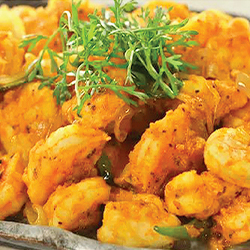
Gastronomically, India has witnessed a remarkable transformation, advancing in leaps and bounds. As we traverse the diverse culinary landscape, a profound shift in people's mind-set can be observed—an eagerness to venture beyond the traditional, an appreciation for the multifaceted Indian cuisine with a contemporary twist. This paradigm shift has spurred chefs to embrace this evolving palate, offering a fusion of modern culinary techniques with age-old recipes, showcasing immense innovation even in the art of presentation.
Simultaneously, amidst this culinary renaissance, we find ourselves embarking on an exciting voyage of discovery, unearthing the hidden treasures of local and indigenous ingredients. The unparalleled regional diversity of our land has ignited a fervent enthusiasm among people to explore the distinct dishes from every nook and cranny of our country.
It is with great pride that we celebrate the "International Year of Millets 2023", as we now strive to present these nutritious grains in more enticing and delectable forms to our own people. It is heartening to witness the rise of foodpreneurs who are introducing millet products in the form of premixes, cookies, namkeen and even noodles, capturing the imagination and taste buds of food enthusiasts.
On the global stage, the confluence of globalisation and the Indian diaspora has given birth to exciting culinary hybrids such as Indo-Chinese, Indo-Thai and Indo-Mexican cuisines. Across the world, Michelin-star Indian restaurants have emerged, offering a refined and elevated dining experience by infusing traditional dishes with a creative flair.
Notably, fine dining establishments have played a pivotal role in showcasing the rich heritage of Indian cuisine, seamlessly blending tradition with modernity. From the vibrant and tantalizing street food to the intricately curated Indian thaali, our culinary heritage has garnered global recognition, captivating the palates of discerning diners worldwide.
CC: What advice would you give to aspiring chefs who want to make a mark in the culinary world?
I have been nurturing my dream of making Indian food a global phenomenon. Of all the international cuisines I’ve tried, no other cuisine matches the depth and intensity of Indian cuisine. It makes me proud to see Indian food getting noticed in its original form as well as in fusion avatars the world over.
People across the world are beginning to value Indian meals. We hear a lot of people going vegetarian. Now, isn’t that a wonderful thing to happen? As for my vision for the future of Indian cuisine, I wish to take Indian cuisine to the No.1 spot.